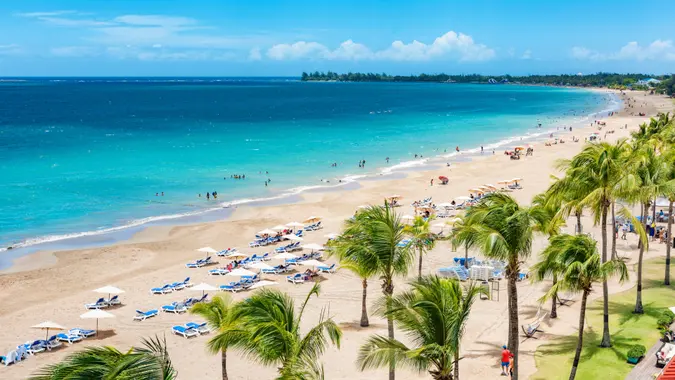How Are High Tariffs Affecting Travel Costs — And Where Can You Save?

Commitment to Our Readers
GOBankingRates' editorial team is committed to bringing you unbiased reviews and information. We use data-driven methodologies to evaluate financial products and services - our reviews and ratings are not influenced by advertisers. You can read more about our editorial guidelines and our products and services review methodology.

20 Years
Helping You Live Richer

Reviewed
by Experts

Trusted by
Millions of Readers
Although many of President Donald Trump’s proposed tariffs have yet to take effect, companies across a wide range of industries are already raising prices in anticipation of higher import costs.
Those rising costs are beginning to trickle down into travel expenses, impacting everything from lodging to transportation.
Experts weighed in on how these tariffs could affect your next trip — and shared tips on how to keep your travel budget in check.
Hotel Prices May Increase
Your lodging costs may increase, according to Steve Schwab, CEO of Casago, because hotels are often directly impacted by tariffs.
“Beyond the cost of construction … which certainly impacts new hotels being built, hotels often rely on all kinds of different products being imported to operate on a day-to-day basis. Things like bedding and electronics are hit hard by tariffs, and as a result hotels are heavily affected by that,” he explained.
Seek Alternative Lodging
Higher priced hotels are a good reason to look for alternative lodging accommodations, such as short-term rentals or even hostels since they may not have to buy new items as often, he pointed out. “[T]hese alternative lodging accommodations often aren’t impacted as heavily by tariffs in the same way,” Schwab said.
Future Travel Is in Question
Right now, travelers don’t appear to be pressing pause on trips that are already planned, according to Daniel Green, cofounder and CTO at Faye Travel Insurance. “We haven’t seen a slowdown as of now,” he said.
However, people have been purchasing more travel insurance, which he said, shows an increase in travel and travel planning, as well as more intentions around preparedness.
“Travelers themselves aren’t showing signs of fear over the tariff news as of today, but seem to be adapting smartly and protecting their travel investments.”
Less Disposable Income To Travel With
In the short term, tariff-driven price increases “across the board” and resulting higher inflation could result in less disposable income for the average person, which could lead to fewer funds for travel, Green said.
“Long-term, tariffs could affect manufacturing and construction, resulting in less hotels, less hotel renovations, less new aircrafts, etc.”
Trickle Down Costs
While historically tariffs have been on goods but not on services, while they’re less likely to affect the cost of your plane ticket, those costs will affect the costs to operate a plane. “Over time those costs may trickle down,” Green said.
Buy Travel Insurance
One thing is certain, since economic challenges can lead to unforeseen financial issues down the road, it’s a good idea to buy travel insurance on any trips you have planned for the future. The policy that Green sees travelers supplementing with the most is “cancel for any reason” protection.
“This enables you to cancel your trip for literally any reason, and recoup up to 75% of the non-refundable trip costs, as long as it’s 48 [hours] prior to your scheduled departure date,” Green said.
Green is not overly concerned about these setbacks to travel. “We’ve also generally seen, even in times of previous financial crisis, if travel goes down it usually bounces back. Any dip in travel tends to always be temporary.”
It’s Giving Pandemic
On the other hand, Alex Alioto, co-founder and the head of growth at Whimstay, said he feels a “notable shift” in the travel industry as Americans increasingly adjust their travel plans in response to economic pressures.
“We’re seeing consumer behavior similar to what we were seeing in the height of COVID, but now driven by economic uncertainty rather than health concerns,” he said.
Some of these changes include great tips for the average traveler to consider:
- Less international travel: Consumers are staying closer to home to save money.
- More last-minute trip taking: Consumers are traveling on the fly when the price is right.
- Emphasis on value: Consumers are seeking deals, discounts and maximum value for their travel dollars.
- Rise in road trips: They’re skipping pricey flights for more affordable road trips.
- Increase in group travel: More Americans are traveling with extended family or friends to share costs.
While the long-term impact of tariffs on travel remains uncertain, staying flexible, seeking value and protecting your plans with travel insurance can help you navigate this high-cost travel climate without sacrificing your next getaway.
More From GOBankingRates
Sources
- Steve Schwab, Casago
- Daniel Green, Faye Travel Insurance
- Alex Alioto, Whimstay
 Written by
Written by  Edited by
Edited by 

























